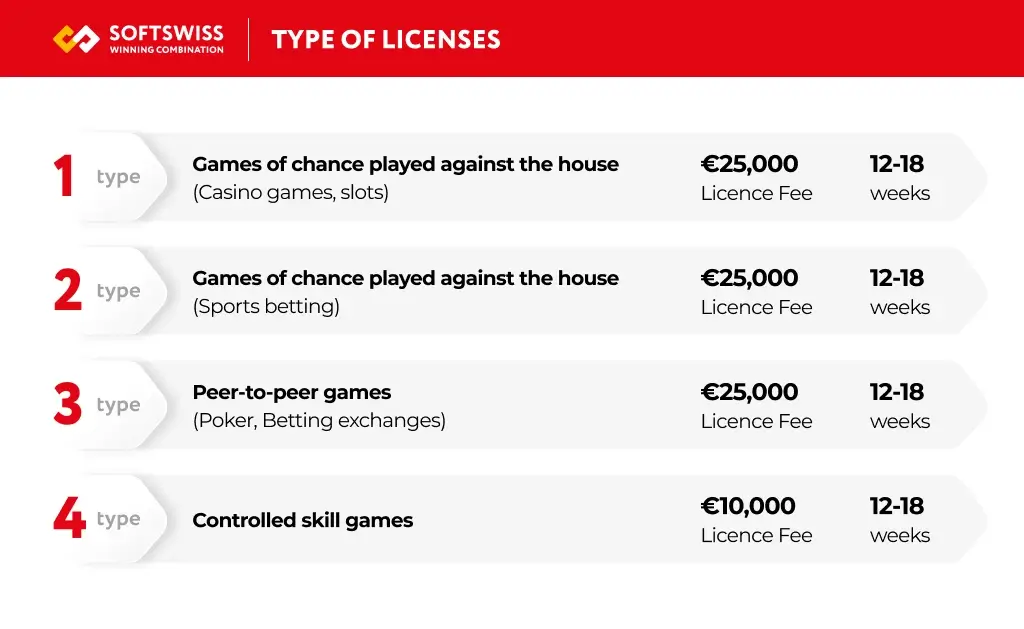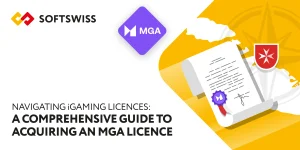Making the choice to obtain a Malta gaming license from the Malta Gaming Authority (MGA) symbolises a significant milestone in any iGaming journey. But this process is no easy feat – even for the most experienced of iGaming operators.
In this article, we’ll take you through the nitty-gritty of how to get a Malta gaming license, its benefits, the application process, and how SOFTSWISS can be the compass guiding you through this complex terrain.
TL;DR: MGA Essentials
Navigating the landscape of acquiring a Malta Gaming license can be complex at first glance.
Four main gaming license types are divided between Gaming Service licenses (for B2C) and Critical Gaming Supply licenses (for B2B). These licenses are available for both the ’Remote Gaming’ and ’Land-Based Gaming’ sectors.
Depending on your situation, here are the four license types to choose from:

To apply for an MGA gambling license, you first need to pay a one-time, non-refundable application fee of €5,000. The process itself then includes a ’fit and proper’ test, business planning, operational and statutory requirements review, and a thorough systems review.
Brief Overview and History
The Malta Gaming Authority (MGA) has a rich history as one of the first regulatory bodies of its kind within the iGaming space. It was this pioneering move that positioned Malta as an iGaming hub, prompting a significant influx of companies to its shores.
- 2001: The Malta Gaming Authority (MGA) – formerly the Lotteries and Gaming Authority – is founded as one of the first regulatory bodies in the industry.
- 2004: Malta joins the EU and becomes the first member state to enact comprehensive legislation for the remote gambling sector.
- 2017: The MGA announces plans to overhaul the legal and regulatory framework for gaming activities, moving away from license classes.
- 2018: Malta enacts the Gaming Act, 2018, streamlining and consolidating all existing gaming sectors under one legislative umbrella.
In the years since its inception, the MGA has continuously adapted its legislative framework to accommodate the rapidly evolving iGaming sector. With the introduction of the Gaming Act in 2018, Malta further enhanced its reputation as an authority in iGaming regulation.
Following the 2018 overhaul, the MGA extended the validity period for licenses from five to ten years. The MGA also moved to issuing just two major license categories: business-to-business (B2B) and business-to-consumer (B2C) licenses.
The B2B license, known as a ’Critical Gaming Supply’ license, enables companies to offer gaming services and software products to other businesses. In contrast, the B2C license, referred to as a ’Gaming Service’ license, is intended for operators directly providing gaming services to players.
These licenses cover four distinct game types, from casino-style games, lotteries (Type 1) to controlled skill games (Type 4). While the B2C license corresponds to specific game types (similar to the previous concept of Class 1, Class 2, Class 3 games, and skill games), the current framework eliminates the requirement for new licenses for each additional game class.
This grants licensed operators the flexibility to expand their game offerings without the need to repeat the licensing process for each new game type.
State of Malta Gaming Licensing in 2025
Since its inception, the MGA has been instrumental in shaping Malta into the globally recognised iGaming hub it is today. The MGA’s robust regulatory framework continues to attract operators seeking a reputable and cost-effective licensing solution.
The authority’s ongoing commitment to regulation and compliance is reflected in their intensive audit and review processes. In 2021 alone, the MGA carried out 54 on-site compliance audits and 230 desktop reviews, covering 65.5% of all licensees.
This dedication to industry compliance is balanced by a commitment to also streamline processes for licensees. Recent years have seen the MGA make significant strides in improving efficiency, reducing unnecessary bureaucracy, and making their processes leaner and more operator-friendly.
As of 2024, Malta is now home to over 300 online gambling companies, with the MGA also being responsible for over 10% of the world’s virtual casinos. This significant presence stems from the MGA’s proactive international strategy which included active involvement in global investigations into sports and gaming integrity, and a commitment to international regulatory collaboration.

